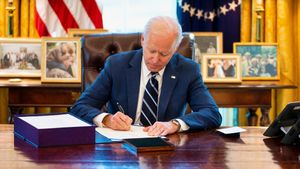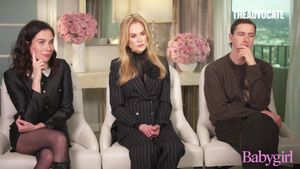Barack Obama won
a coveted endorsement from a former rival Tuesday as the
Democratic candidates prepared for an evening debate that
offered Hillary Rodham Clinton one of her last changes
to blunt Obama's momentum before next week's must-win
primaries.
The two
Democratic presidential contenders face off at Cleveland
State University just a week before the March 4
primaries in Ohio and Texas that Clinton must win to
keep alive her faltering bid to become the first woman
U.S. president.
She suffered a
setback Tuesday as Democratic senator Chris Dodd, who has
long-standing ties to the Clintons, endorsed Obama.
''He's ready to
be president, and I am ready to support him in this
campaign,'' Dodd said at a joint news conference with Obama.
Obama and Clinton had been vying for Dodd's support
since he exited the presidential race after a poor
showing in the Iowa caucus last month. Dodd, 63, won
his Senate seat in 1980 and chaired the Democratic National
Committee from 1995 to 1996.
Obama has won
some key Democratic endorsements in recent weeks, including
Massachusetts senator Edward Kennedy, a close friend of
Dodd's.
On the Republican
side, John McCain campaigned in Ohio on Tuesday, a day
after he told reporters he must convince a war-weary country
that U.S. policy in Iraq is succeeding to win the
White House, or else ''then I lose. I lose.''
He then backed
off that remark, saying merely that Iraq would be a part
of voters' judgment of his ability to handle national
security.
The five-year-old
Iraq conflict is emerging as a fault line in the
general election, with the Arizona senator calling for the
U.S. military continuing its mission while his
Democratic opponents urge quick withdrawal.
A coalition of
antiwar groups that was influential in last year's
political debate on Iraq says it plans to spend more than
$20 million this year to convince voters that McCain
and the Republican Party's support for the war is bad
for the economy.
In a conference
call with reporters Monday, activist leaders said they
believe voters will blame Republicans this fall for
supporting the war at a time of rising health care and
college costs and a mortgage foreclosure crisis.
''Leaders who do
not recognize this connection will be at a disadvantage
come Election Day,'' said Jeff Blum, director of USAction,
which plans to spend $10 million organizing a
grassroots effort against Republican candidates. Blum
said the group intends to dispatch hundreds of thousands
of volunteers to go door to door to convince voters that the
Republicans' war effort is hurting the economy.
Hoping to slow
Obama's surging candidacy -- which has been boosted by 11
straight wins in nominating contests since February 5 --
Clinton painted a picture of a dangerous world in need
of seasoned and wise U.S. leadership. She portrayed
Obama as a national security novice and said Americans
can be assured she would not need a ''foreign policy
instruction manual'' to keep the country safe.
In thinly veiled
criticism, she compared her Democratic rival's foreign
experience to that of President George W. Bush upon taking
office in 2001.
Voters have
already seen the ''tragic result'' of electing a commander
in chief with little experience in national security
and global affairs, she said in a speech at The George
Washington University. ''We can't let that happen
again. America has already taken that chance one time too
many.''
She slammed Obama
as inconsistent for saying during a televised debate
last summer that he would be willing, as president, to meet
without preconditions with the leaders of Cuba, Iran,
and other nations hostile to the United States, and
also for saying he would be willing to send U.S.
troops into Pakistan if there were ''actionable
intelligence'' that the country is harboring
terrorists.
Anticipating the
former first lady's criticism, Obama's foreign policy
advisers held a conference call with reporters before she
delivered her speech. Top Obama adviser Susan Rice
said the New York senator had shown poor judgment on a
range of issues, including voting to authorize the
invasion of Iraq and supporting legislation declaring the
Iranian National Guard as a terrorist organization.
Obama, meanwhile,
put in something of a good word for Clinton at an Ohio
campaign stop, saying voters should support Democrats,
because ''myself or Senator Clinton, we're all
concerned about creating a better social safety net.''
He then pivoted
into comparison mode, saying he was the candidate with
the ability to reach across the aisle to Republicans and
implying that Clinton is beholden to special
interests.
Nationally, Obama
has taken a clear lead over Clinton among white men,
middle-income earners, and liberals, groups that were evenly
divided or with whom she had the advantage two weeks
ago. Overall, Obama has 46% to Clinton's 43%, a
virtual tie. But Clinton had a slight five-point lead
nationally in early February, according to the AP poll.
A CNN-Opinion
Research Corp. poll released Monday showed that Obama and
Clinton were about even in Texas, with Obama at 50% to
Clinton's 46%. The poll, conducted February 22-24, had
a margin of error of plus or minus 3.5 percentage
points. Polls also showed Clinton's lead was narrowing in
Ohio.
The Republican
race is considered settled in favor of McCain, the veteran
Arizona senator and a former Vietnam prisoner of war. (AP)

















































































